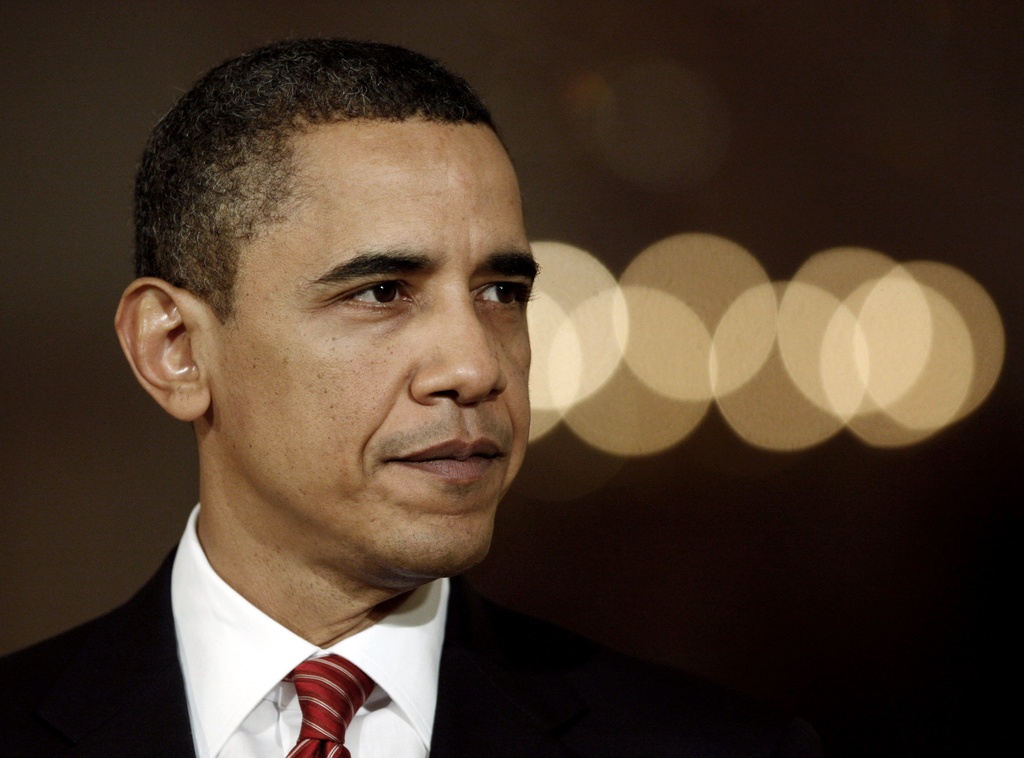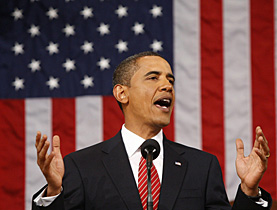Dreifuss welcomes “historic” US healthcare bill

The United States healthcare vote is a decisive step in the right direction, Ruth Dreifuss tells swissinfo.ch. The former minister oversaw Swiss reforms in the 1990s.
On Sunday the US House of Representatives gave its final approval to a sweeping healthcare overhaul, expanding insurance coverage to an estimated 95 per cent of Americans.
The bitterly-fought health reform bill, which will cost an estimated $940 billion (SFr996 billion) over ten years, was passed by 219 votes to 212.
The overhaul will extend health coverage to 32 million Americans, expand the government health plan for the poor, impose new taxes on the wealthy and bar insurance practices such as refusing to cover people with pre-existing medical conditions.
As Swiss interior minister in charge of health, Dreifuss oversaw the health insurance law reform which entered into force in 1996. Earlier this month she participated in a debate on US health reform at Harvard Business School.
swissinfo.ch: What is your reaction to Sunday’s vote?
Ruth Dreifuss: It’s a historic vote, like the Swiss one concerning the health insurance law reform. It represents a decisive step in a battle that has gone on for decades since the first initiatives by US presidents Franklin Roosevelt and then Harry Truman.
The bill is very complex and the result of all kinds of deals. And coverage is not universal, so some people will still be ruined by healthcare costs or be unable to afford them. But it’s a huge step forward and any law can be improved…any law has to be improved when its implementation has negative side effects.
swissinfo.ch: What parallels can you draw between this vote and the Swiss reforms?
R.D.: There are numerous [parallels]. We have a similar mentality to the Americans concerning our fear of excessive state intervention and a high regard for individual responsibility and freedom.
Like the Americans, the Swiss took a long time to find ways of surmounting the scandalous situation in which people lived without medical healthcare.
swissinfo.ch: Republican and industry critics said the $940 billion bill was a heavy-handed intrusion in the healthcare sector that will drive up costs, increase the budget deficit and reduce patients’ choices. What’s your view?
R.D.: People who find it’s too expensive always remind me of that famous comment by [former US President] Thomas Jefferson, “If you think education is expensive, try ignorance.” You could say the same here: if you think the Obama plan is expensive, then simply continue to condemn people to not receiving healthcare, not being able to work and being wracked by illness.
The hardest thing now – and it’s also the case in Switzerland – will be to see what rationalisation measures can reduce rising health costs. As lots of observers have said, “It’s over, but it’s just begun.” Things will now have to be clarified in the medical world and cost-control tools will have to be developed. But this problem is common to all countries, linked to issues of demography and the evolution of medical technology and knowledge but also to the permanent battle involving medical lobby groups.
swissinfo.ch: Is the US moving towards a “Swiss-style” healthcare system?
R.D.: There are still very big differences between the two systems, but as New York Times columnist, economist and Nobel Prize winner Paul Krugman said a few months ago, Switzerland is the European system that most resembles the Obama health plan.
swissinfo.ch: The US rejected the public healthcare system option. What about possibly introducing it in Switzerland?
R.D.: Since the multi-party compromise that allowed us to introduce universal coverage under the healthcare reform, with a large number of private companies the issue of a single health insurance company arose several times… and will certainly be on the table again soon.
It’s clear that in the Swiss system, which is slightly different from the US system, the competition between various companies did not bring the expected results in terms of cost control.
In Switzerland competition is much more restricted than in the US. The real competition is over the quality of services to the insured person, including managed services, while the catalogue of services and tariffs are unified by law or negotiation in Switzerland. Under such conditions, the alternative is not competition between public and private insurance schemes but a single health insurance system.
swissinfo.ch: The Republicans say they will seek to repeal the new bill, challenge its constitutionality and try to block its implementation. Does it have a solid future?
R.D.: This ongoing political battle is distressing. But I don’t think the public likes this battle or Fox News’ climate of brutal politics, contempt for opponents and lies. The individual citizen expects solutions.
I share the line of a recent Washington Post editorial that said that it’s easier to scare the population about a project than about the reality. The majority of Americans will realise that this is an extremely important positive step that has been taken. And I’m sure they won’t want to return to the former discriminatory, cruel situation.
Simon Bradley, swissinfo.ch
Ruth Dreifuss was born in St Gallen on January 9, 1940.
From 1972-1981 she worked at the Swiss Agency for Development and Cooperation and the humanitarian aid office of the Swiss foreign ministry. In 1981 she became secretary of the Swiss Federation of Trade Unions.
On March 10, 1993 she was elected to the Swiss cabinet. She was in charge of the interior ministry, which covers health, social welfare, culture and the environment, until she stepped down on December 31, 2002. In 1999 she was the first woman to hold the rotating Swiss presidency.
Switzerland ranks third in health spending in industrialised countries, spending 10.8% of gross domestic product. This is below the US (16%) and France (11%).
Switzerland also ranks higher than the OECD average on spending per person, which totalled $4,417 (SFr4,760) in 2007, below the US ($7,290) and Norway ($4,763). The OECD average is $2,964.
Switzerland also has a high density of people working in the health sector, with 3.9 doctors and 14.9 nurses per 1,000 residents.
According to the European Observatory on Health Care Systems, formalised health insurance began in Switzerland as early as 1899, but the system, based on Germany’s, was rejected at the polls.
A new proposal passed by referendum in 1911. To qualify for federal money, “health funds” had to provide a set list of benefits and allow consumers to change plans. Cantons could decide whether to make insurance compulsory.
Partial reforms came in 1958, followed in 1964 with measures that bolstered federal subsidies. Rates continued to increase and in 1987 legislators introduced reforms to control costs. The measure failed.
In the 1990s, after the private carriers began to deny coverage for pre-existing conditions and when the uninsured population reached 5%, the Swiss held a referendum and adopted their present system on March 18, 1994.
Another round of reforms will go into effect in 2012 that are designed to make hospitals more dynamic by restructuring subsidies and requiring providers to publish quality indicators.
The Swiss system is a combination of public, subsidised private and totally private healthcare providers, where the insured person has full freedom of choice among the providers in his region. Insurance companies independently set their price points for different age groups, but are forbidden from setting prices based on health risk.

In compliance with the JTI standards
More: SWI swissinfo.ch certified by the Journalism Trust Initiative





You can find an overview of ongoing debates with our journalists here. Please join us!
If you want to start a conversation about a topic raised in this article or want to report factual errors, email us at english@swissinfo.ch.